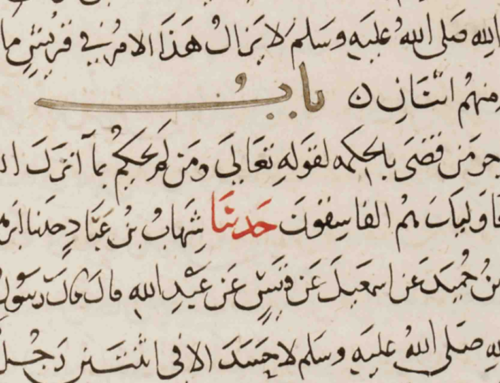Translated by Muhammad Habib
Author: Abu Muhammad ‘Abd’Allah ibn Abi Jamrah al-Maliki al-Andalusi, translation and explanatory notes: ‘Allamah Zafar Ahmad ‘Uthmani, publisher: Idara Islamiyyat (Lahore), 2 Volumes, 656 pages.
‘Allamah Muhammad ibn Abi Jamrah (may Allah shower His mercy upon him) is from amongst the renowned scholars and sufis of seventh century (Hijri) Spain who adhered to the Sunnah. He authored a commentary of Sahih al-Bukhari, entitled, Bahjat al-Nufus, [1]The leader of the ‘ulama of his era, Shah ‘Abd al-‘Aziz al-Dahlawi, writes: ‘‘He selected about 300 hadith in it from Sahih al-Bukhari and did a commentary on them. It consists of two … Continue reading which was written in a completely unique and rare style. In this commentary, the ‘Allamah has derived rulings of tasawwuf and ihsan in a wonderfully in-depth manner, from which it is made clear that tasawwuf is not a separate entity to the Shari‘ah, but is an important part of the religion (din), and is essentially derived from the Qur’an and Sunnah. The subtleties, inner dimensions, delicate academic points of the hadiths and, in particular, the guidance given to the one traversing the path of tasawwuf, in this book by ‘Allamah Ibn Abi Jamrah (may Allah shower His mercy upon him) are so great and valuable that at times during the read the soul becomes ecstatic. The beauty of it is that these subtleties and inner dimensions are not expounded by the author with any formality or special preparation but are derived from the hadiths in a spontaneous and informal manner.
In this era, Allah had chosen Hakim al-Ummah Mawlana Ashraf ‘Ali Thanwi (may Allah sanctify his secret) for the tajdid (revival and reformation) of all the fields of religion, especially the science of tasawwuf and spiritual nurturing. Due to the specialities of ‘Allamah Ibn Abi Jamrah’s (may Allah shower His mercy upon him) book, Hakim al-Ummah Mawlana Ashraf ‘Ali Thanwi was greatly fond it. [2]Hakim al-Ummah Mawlana Ashraf ‘Ali Thanawi wrote: ‘‘I have come across a book, Bahjat al-Nufus, which is a commentary of an abridgement of Sahih al-Bukhari by the same author. The text is an … Continue reading Therefore, it was his desire that it be rendered to Urdu. The good fortune of fulfilling this desire had been decreed by Allah to be the lot of ‘Allamah Zafar Ahmad ‘Uthmani (may Allah sanctify his secret). Accordingly, he translated this book, naming it Rahmat al-Quddus, and added his own explanatory notes to the translation throughout, which comprise valuable academic and reformatory discussions. [3]It should be noted that ‘Allamah Zafar Ahmad ‘Uthmani translated the commentary of only the first hundred hadiths from Bahjat al-Nufus. Also, he translated only those parts of the commentary in … Continue reading It is difficult to find an equal in this era to the rank in knowledge and virtue that Allah had granted ‘Allamah Zafar Ahmad ‘Uthmani (may Allah sanctify his secret), and this book truly reflects this.
After being published in India once, this book had been out of print. Idara Islamiyyat has now done a great favour to those who are thirsty for knowledge by diligently publishing it once again. [4]Idara Islamiyyat published it as Intikhabe Bukhari Sharif. (Translator) It is hoped that it will be valued by the people of knowledge and tasawwuf.
(Rajab al-Murajjab, 1401 AH)
Tabsiray, (Karachi: Maktabah Ma‘arif al-Qur’an, Rabi‘ al-Awwal 1426/April 2005 ed.) p. 89-90
| ↑1 | The leader of the ‘ulama of his era, Shah ‘Abd al-‘Aziz al-Dahlawi, writes: ‘‘He selected about 300 hadith in it from Sahih al-Bukhari and did a commentary on them. It consists of two volumes. He included obscure sciences and hidden truths. He was one of the great awliya’ and gnostics of Allah. He manifested many miracles, and among them the greatest of them was that he said, ‘Praise be to Allah Almighty, I have never disobeyed Allah.’’’ (The Garden of Hadith Scholars – Bustan al-Muhaddithin, p.306 [Turath Publishing, 1428/2007 ed.]) |
|---|---|
| ↑2 | Hakim al-Ummah Mawlana Ashraf ‘Ali Thanawi wrote: ‘‘I have come across a book, Bahjat al-Nufus, which is a commentary of an abridgement of Sahih al-Bukhari by the same author. The text is an abridgement of Sahih al-Bukhari without the chain of narrations and repetitions therein. In its commentary the author has, from the hadiths and at times from the verses of the Qur’an, derived many rulings concerning the esoteric sciences just as he has done regarding the exoteric sciences. Its being referred to, on occasion, in Fath al-Bari is proof enough of its reliability. As the subject matter of ‘Unwanat al-Tasawwuf and a part of this book is the same, it has been made known to aspirants of this science. – Ashraf ‘Ali, 8th Rabi‘ al-Awwal, 1353 AH. ’’ (Reproduced in Intikhabe Bukhari Sharif, p. 3-4) |
| ↑3 | It should be noted that ‘Allamah Zafar Ahmad ‘Uthmani translated the commentary of only the first hundred hadiths from Bahjat al-Nufus. Also, he translated only those parts of the commentary in which issues relating to tasawwuf have been discussed. More details on ‘Allamah Zafar Ahmad ‘approach to the translation can be found in his introduction. (Translator) |
| ↑4 | Idara Islamiyyat published it as Intikhabe Bukhari Sharif. (Translator) |







An excellent book, I have a copy. Thoroughly enjoyable. Many thanks for the review.
Where can I get hold of a copy im in the uk.